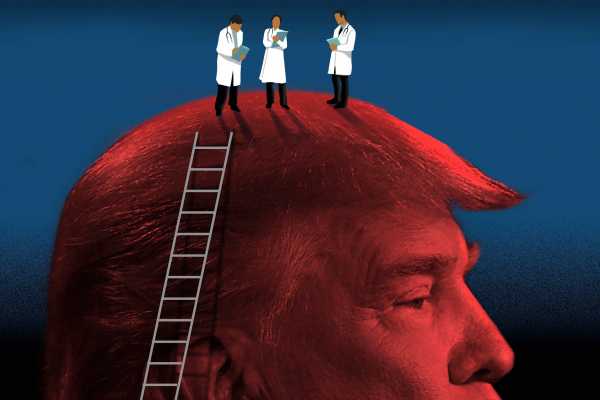
On Tuesday, Donald Trump’s physician told the world the president is of sound mind and fit for the job.
“My personal experience is that he has absolutely no cognitive or mental issues whatsoever,” Dr. Ronny Jackson, who sees Trump regularly and also cared for Presidents George W. Bush and Barack Obama, told reporters. “I think he will remain fit for duty for the remainder of this term and even for the remainder of another term if he’s [re]elected president.”
The statement seemed aimed at everyone who’s been questioning Trump’s mental fitness, and particularly at the medical professionals who’ve never met or examined Trump but have been fervently discussing his mental health with Congress, CNN, and other media outlets.
We know Trump was aware of such talk because he requested a cognitive exam during his first annual physical with Jackson. The results weren’t particularly conclusive — the test looked for overt signs of dementia, not subtle indicators of cognitive decline. But it was an instructive moment.
As psychiatrists and psychologists try to fit Trump’s patterns of behavior into alleged mental health problems, it’s increasingly clear why any medical case against Trump is ultimately a dead end.
Trump has shown he can combat his medical critics by voluntarily taking a cognitive test and passing it. But more importantly, the American people don’t need medical experts or cognitive test results to assess whether Trump is unfit for office — we have reams of evidence, old and new, of his behavior to judge ourselves.
There may be reasonable feelings of fear and hopelessness among Trump critics that he will not be held accountable by his record alone. But experts in lab coats pathologizing him are unlikely to convince Republican leaders that he is unfit (especially in a polarized political age of decreased faith in expertise and institutions).
Focusing on tests and possible mental disorders or impairment is just a distraction from an uncomfortable truth: Trump is terrible at his job. But for the people around him who have the power to remove him from office, he’s not yet bad enough.
For now, science can’t prove Trump is in a state of decline or mentally ill



There’s been a fascinating debate in psychology and psychiatry circles about Trump’s mental state over the past several months.
One active participant is John Gartner, the clinical psychologist who started a petition to remove the president and told Vox that Trump is “the worst case [of Narcissistic Personality disorder] I have seen in my career.” Another is Bandy Lee, an assistant professor of psychiatry at Yale, who recently told members of Congress (and us) that she believes Trump is in the midst of a “a mental health crisis,” and that he is so dangerous that he should be contained and removed from his access to weapons, and should undergo an emergency psychiatric evaluation.
Some, like Gartner, have been trying to win support for the idea that the 71-year-old Trump has a personality disorder, or early-stage dementia, or some other clinical condition. They’ve been scolded by the American Psychiatric Association, which in March reaffirmed and expanded the Goldwater Rule, the stipulation that members never publicly discuss the mental health of a public figure.
Lee and 27 other mental health professionals further sparked debate with a book called The Dangerous Case of Donald Trump that argues “Trump’s mental state presents a clear and present danger to our nation and individual well-being.” Criticism and praise of the book made the vaunted pages of the New England Journal of Medicine.
Many of the same people who authored Dangerous Case sent a letter to Dr. Jackson, Politico reported, imploring him to evaluate the president’s neurological health. In the letter, they described their “increasing concern” about Trump’s “declining faculties for complex thought, rambling speech, [and] difficulty completing a thought,” along with “suspect judgment, planning, problem solving and impulse control.” Congress has received similar requests for psychiatric evaluations of Trump.
Several experts in psychiatry have argued that these diagnoses from afar are problematic; that they’re unethical and break the Goldwater Rule. But the debate over whether professionals have the free speech right to weigh in is different from whether they should. These particular efforts to diagnose Trump feel, in a way, naive. They seem to assume that scientific opinion and tools can prove he is in a state of decline, and will be accepted by the rest of the government, which will decide he is unfit to be president.
Apparently it was the cable news coverage of Michael Wolff’s book Fire and Fury, which revealed that the president’s closest advisers aren’t confident in his mental stability or cognitive ability, that made Trump go on the defense about his mind. He responded at the end of the frenzied week when the book came out that “actually, throughout my life, my two greatest assets have been mental stability and being, like, really smart,” followed by the much-mocked “stable genius” tweet.
The following week, though, he volunteered to do the Montreal Cognitive Assessment, a standard test of cognitive fitness that could rule out obvious neurological impairment. He passed with a perfect score of 30/30.
Related
Trump aced the Montreal Cognitive Assessment. Here’s what that means.
Then we got Jackson’s strangely confident affirmation that the president is fit enough to not only finish his term but serve another (which he would begin at age 74).
The episode made it clear that the standard tools of medicine won’t, at least at this point, with this doctor, discover anything damaging about Trump.
Having a disorder or disability wouldn’t necessarily make a president unfit for office
The episode also served to validate another camp of psychiatrists who’ve been publicly pushing back against their colleagues’ warnings of Trump’s possible mental illnesses or disorders.
They include Richard Friedman, a professor of clinical psychiatry at Weill Cornell Medical College, who had a terrific piece on January 10 in the Washington Post titled “No, Trump doesn’t need a mental fitness evaluation.” And Jeffrey Lieberman, the chair of psychiatry at Columbia University Medical Center and former president of the American Psychiatric Association, who recently argued in the New York Times that Trump isn’t mentally ill and maybe is just a jerk.
As Friedman told us in an email, claiming Trump has a disorder isn’t useful because “the presence of a mental disorder in a president is neither necessary nor sufficient to make him or her unfit for office, obviously — since psychiatric illness need not be a bar to being president if it’s mild and/or treated. … You can be depressed or anxious, for example, and perfectly able to do your job — whether you are a taxi driver or president.”
Trump routinely complains that negative press coverage about him amounts to a “witch hunt.” Going after the ultimately unknowable configuration of his mind from afar is much more of a “witch hunt” than actually analyzing what he’s said and done. It’s less fair and, arguably, less damning.
Yale’s Bandy Lee has said it could be possible to get Trump involuntarily committed to a mental health institution. Involuntary commitment has a contentious history in psychiatry (the result of people being institutionalized against their will, for unconvincing reasons), and the ethics of it are still being debated today. In an interview with Vox, Lee admitted that forcibly removing the president from a position where he can cause harm “will really look like a coup.”
There’s also this tricky fact that throws a wrench into efforts to diagnose or assess Trump: He lies, a lot. And it’s too easy to confuse a propensity to bullshit through life with a lost grip on reality. This past November, Trump said he wasn’t so sure if it was his voice on the infamous Access Hollywood tape where he bragged about sexually assaulting women. Was that a break with reality or a calculated argument from a notorious bullshitter?
“Everyone has a personality,” Allen Frances, professor emeritus of psychiatry and behavioral sciences at Duke University Medical College, who has also resisted the calls to diagnose Trump, told us last year. “It’s not wrong to have a personality; it’s not mentally ill to have a personality.” Similarly, he recently argued on Twitter, there’s no cure for being an “asshole.”
And even if Trump’s behavior is purely the result of his personality, that’s still consequential. Personality is a mostly stable trait. What’s more, research finds that ascending the ladder of power only magnifies your personality traits, and makes you more likely to act in accordance with them. You don’t need a diagnosis to say that Trump has a troubling pattern of behavior or conclude that pattern is bound to repeat.
Medicalizing Trump’s behavior also casts an unfair light on the mentally disabled and ill who, often, are perfectly capable of carrying out the duties of their jobs. Behind words like unhinged and crazy “lies the all too common assumption that a person who has a mental health disability cannot possibly be trusted, let alone successful,” the Bazelon Center for Mental Health Law, an advocacy group for the mentally disabled, stated last week.
The evidence that Trump is unfit to be president
A medical case against Trump also redirects us from the fairer, more objective categories we can use to judge him. These are the details that could come up in an impeachment proceeding, should Congress ever decide to bring the president to trial. As Vox’s Ezra Klein explains, the definition of an “impeachable offense” is pretty broad, and can encompass more than outright crimes — for instance, “egregious violation[s] of the public trust.”
What follows are the more important questions we have to grapple with in an evaluation of whether Trump is “fit” for office. (You don’t need a medical diagnosis to answer them.)
- Did he obstruct justice? (The case for that looks pretty damning.)
- Does he run an organized White House that communicates well internally? (By all accounts, no.)
- Is he a racist? (Yes.)
- Is he well informed of, and have a clear understanding of, current events here and abroad? (If he does, it doesn’t come out in interviews with newspaper journalists.)
- Is he respectful of others? (Remember “Grab ’em by the pussy?” Crooked Hillary? Little Rocket Man?)
- Does he reckon with the tough realities of policymaking? (No.)
- Does he use the best available resources to aid his understanding of the world? (Fox & Friends remains one of his key sources of news, despite being the head of a vast global intelligence-gathering operation.)
- Is he of firm moral character? (On Friday, In Touch Weekly ran an interview with an adult film actress who claims she had sex with Trump while he was married to Melania Trump. Trump then reportedly paid her for her silence during the presidential campaign.)
Removing Trump with the 25th Amendment wouldn’t be up to doctors. It’s up to Vice President Mike Pence and the Cabinet.
Here’s the ultimate reason why medicalizing Trump’s behavior is a dead end. The question of the mental fitness of Donald Trump isn’t a medical question, even though the 25th Amendment is designed to empower the government to remove a mentally unfit president. It’s a political question.
When the 25th Amendment was ratified in 1967, it included Section 4, which permits the vice president and a majority of the Cabinet or a body created by Congress to strip the president of his powers without his consent and transfer them to the vice president.
To do so, they would have to decide that the president is “unable to discharge the powers and duties of his office.” But as Vox’s Andrew Prokop has written, Pence and the Cabinet can simply put that down in writing and send it to two people — the speaker of the House and the Senate’s president pro tempore.
The process theoretically starts with Pence, who would have to “determine in his own mind that the president can’t meet his constitutional responsibilities because of a variety of mental reasons,” as Jay Berman, a former chief of staff to Sen. Birch Bayh (D-IN) and one of the co-authors of the amendment, told Vox’s Sean Illing in an interview. “We determined that it would be a political decision left to the vice president, the Cabinet, and Congress. That’s how we designed it, for better or worse.”
The part about what would constitute inability to handle the duties and powers of the office was left intentionally vague. Which means “we lack a clear constitutional standard for what severity of impairment would render him unfit to serve,” as Jeffrey Lieberman, the Columbia psychiatrist, has pointed out.
There are “evident risks to opening the door to using the 25th Amendment to remove presidents on the basis of general concerns about unfitness or mental instability,” as Keith E. Whittington wrote for Vox last year. He continued:
Ultimately, our democracy makes it voters’ job to assess the character and competence of our leaders before we elect them.
As of right now, the chances of Pence taking any action around unfitness are extremely low. “Short of watching Donald Trump run naked and screaming down Pennsylvania Avenue on prime-time television, Mike Pence (or any vice president) would never begin such proceedings,” writes Elaine Kamarck of the Brookings Institution, who once worked for Vice President Al Gore.
Medicalizing Trump is a distraction
Medicalizing Trump is a distraction from reckoning with the political and media environment that led to the election of a man of his character and qualification. It’s a distraction from the fact that many Americans think (or have thought) that Trump’s naivety in politics, his zero-sum thinking, and his obsession with “winning” are his most appealing characteristics.
“Everybody knew who Donald Trump was when they elected him,” as Harvard Law professor Alan Dershowitz has said.
The medicalized case against Trump could also continue to fall apart. He could very well undergo more cognitive assessments and pass. And then what are we left with? We’re left with analyzing the things he’s said and the actions he’s taken, which is where the argument against Trump should have been grounded in all along.
This isn’t to say that a medical case against Trump could never be made. That if he does slip into dementia, or gets otherwise sick, his fitness for office could be called into question by medical professionals.
As we’ve discussed, the power to remove Trump from office rests with Republican leaders. They’re unlikely to use that power to impeach him or initiate the 25th Amendment — unless, perhaps, the situation deteriorates dramatically.
But a growing majority of the public sees the case against Trump’s fitness for office. It’s absorbing it. His job approval ratings since the inauguration continue to quiver between 30 and 40 percent.
And “President Trump’s grades on most character traits are down significantly since his first post-inaugural poll [on] January 26, 2017,” a Quinnipiac University Poll recently found. Sixty-three percent now say Trump is not honest. A year ago, that figure was at 52 percent. In November 2016, 56 percent of those polled said Trump had good leadership skills; now it’s 39 percent.
Increasingly, the public sees Trump for who he is. When will Republicans?
Sourse: vox.com






